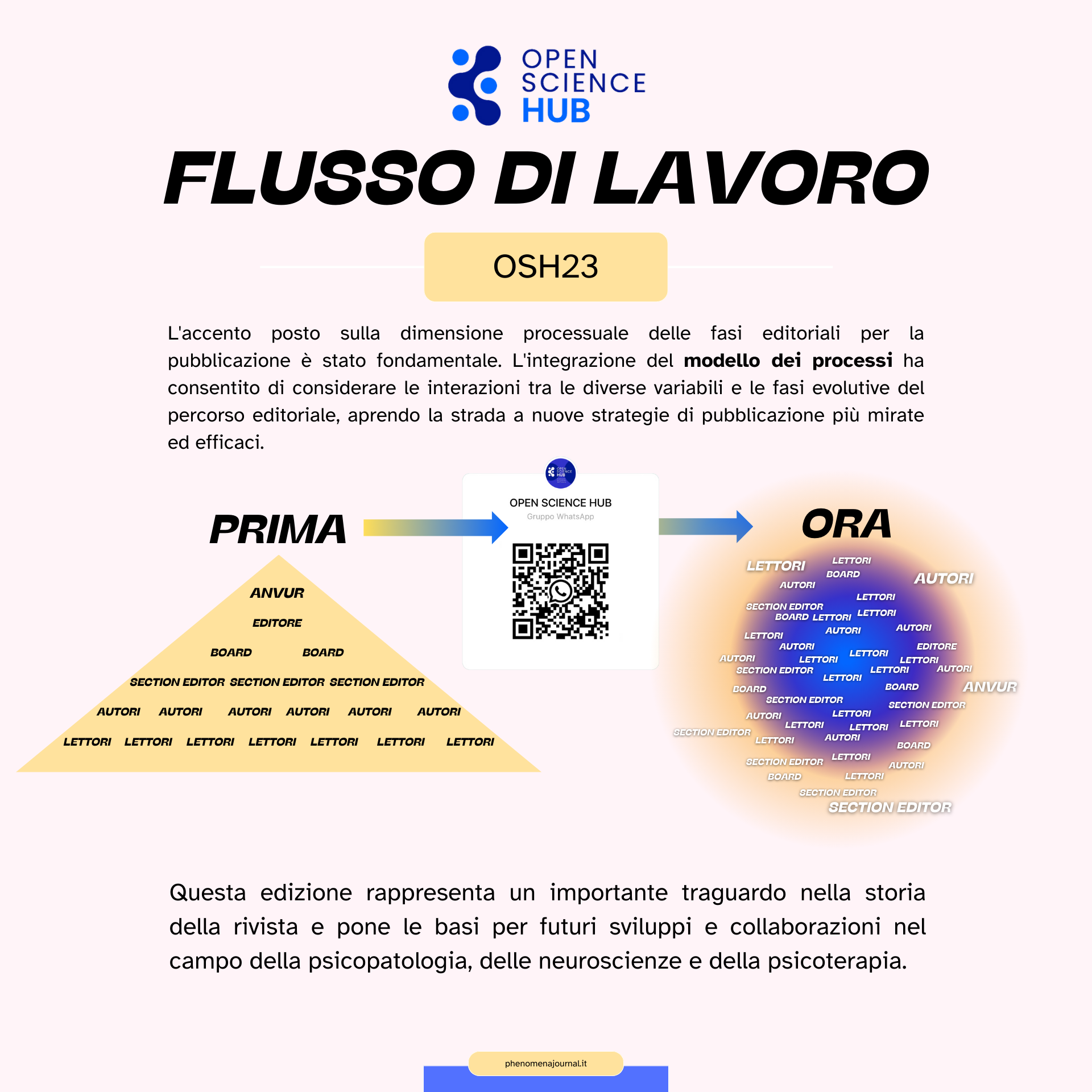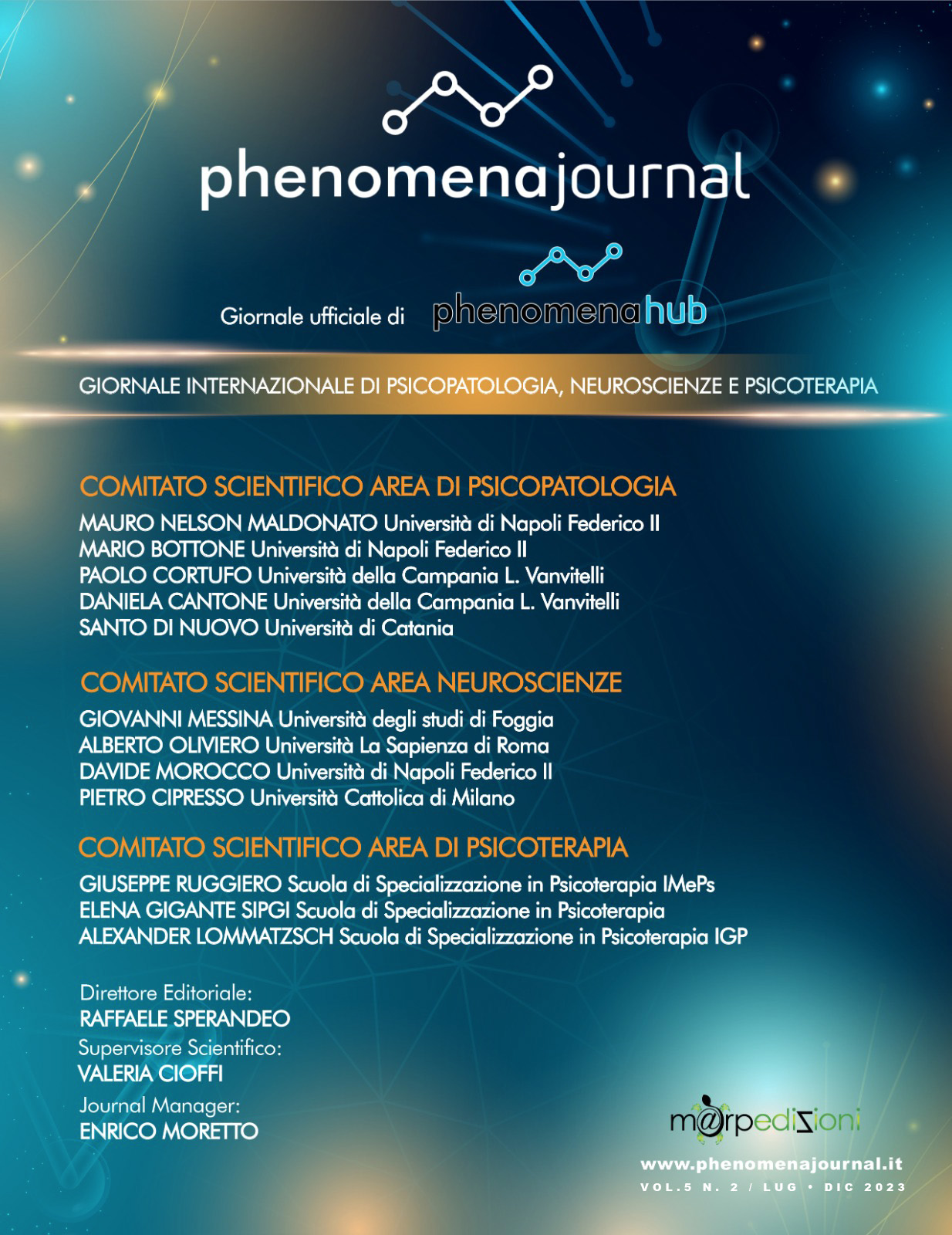Vol 5, No 2 (2023): July - Decembre 2023
Issue Description
Phenomena Journal is a six-monthly journal written in double-blind peer review aimed at experts in the fields of Psychopathology, Neuroscience and Psychotherapy. The journal aims to publish articles, reviews, methodological study hypotheses, opinion articles, produced by names of the national and international panorama of the sectors of interest of the magazine. In addition, the newspaper aims to spread scientific culture in sectors that are not exclusively academic, such as clinical areas not specialized in research projects.The newspaper, run by the Phenomena research group, published by Marp Edizioni, offers editorial support through a flexible and available way for all those who want to get closer to the world of Scientific Research. The articles are available at www.phenomenajournal.it and are covered by an Open Access license.
EDITORIAL
Gestalt and science: the complex networks model applied to editorial processesby Enrico Moretto
In issue 5, Number 2 (2023) of "Phenomena Journal", dedicated to the fifth anniversary of the journal, the editorial focuses on the evolution of the complex networks model in psychotherapy and the editorial process behind its publication.
This issue represents the culmination of an annual editorial project as part of the “Open Science HUB: building the science of the future” initiative, which involved prestigious institutions and specialization schools throughout Italy. The Open Science HUB (OSH) project concluded with a scientific event which saw the participation of numerous experts in the sector, including Prof. Gianni Francesetti.
The project, with the participation of: the Puglia Gestalt Institute (IGP), the Florence Gestalt Institute (IGF), the BenessereNapoli Psychotherapy Studio, the Turin Gestalt School (SGT), the Association for the Psychological Development of the Individual and the Community (A.S.P.I.C.), the Instituto Encuentro de Gestalt de Uruguay and the School of Specialization in Integrated Gestalt Psychotherapy (SiPGI), have brought a series of contributions that emphasize the importance of complex networks in understanding the new scientific frontiers applied to mental health.
The emphasis placed on the procedural dimension of the editorial phases for publication was fundamental. The integration of the process model has allowed us to consider the interactions between the different variables and the evolutionary phases of the editorial path, paving the way towards new, more targeted and effective publishing strategies. This "field" approach allowed us to examine not only the content of the articles but also the context and process behind their creation, offering a more complete vision of the editorial work.
The complex networks model, ecological by nature (Figure 1), with its emphasis on connections and interdependencies, has found application not only in the content of the articles but also in the editorial process itself, reflecting the interconnected and dynamic nature of editorial work of a scientific journal marking a clear Before and After for the journal.In this edition it emerged that in addition to writing, it is important to participate in reviews, discuss between authors and above all read the contributions of colleagues. Creating more connections also means making the scientific works of Gestalt therapy more identifiable and recognizable. A proposal, which emerged during the last days of the 2023 edition, could be to add the acronym GT (Gestalt Therapy) to the titles that deal with Gestalt science and psychotherapy, with the possibility of being more recognizable on the databases that collect the articles. to thus open ourselves up to scientific dialogue, together.
In conclusion, this issue of "Phenomena Journal" celebrates not only the fifth anniversary of the journal but also the success of an editorial project that has been able to expertly integrate scientific content and editorial process, contributing significantly to the field of psychotherapy and scientific research. This edition represents an important stage in the history of the journal and lays the foundations for future developments and collaborations in the field of psychotherapy and neuroscience.

